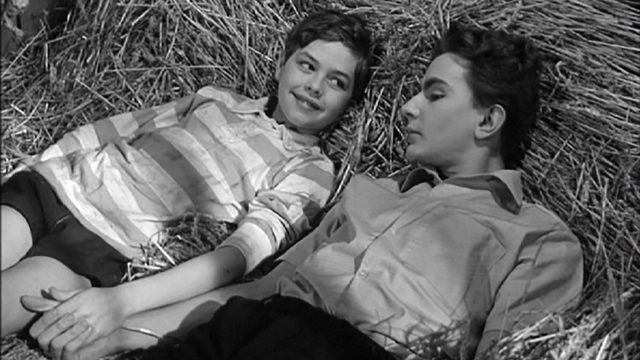There’s a sequence, too fleeting, in “Once More With Feeling,” the musical episode of Buffy the Vampire Slayer, in which Tara sings of her love for her girlfriend Willow. It stands apart from the rest of the episode in that the song is neither jokey nor a pastiche of an established musical style. It feels dropped in from some parallel universe, a place where “romantic lesbian musicals” are an established genre. Les Amitiés Particulières (This Special Friendship), the 1964 movie directed by Jean Delannoy based on a novel by Roger Peyrefitte, might have slipped over from the same parallel world. It’s so familiar in form and structure yet its story seems unique, both for when it was released and now. If Truffaut had been queer he might have made something like it and if he had, perhaps it wouldn’t have all but disappeared from the history of film. It’s never been released on dvd in the US, though you can find it on YouTube here:
Georges de Sarre is a new student at a boys-only Jesuit boarding school in France. He’s introduced to the idea of “special friendships” – amorous attachments between the students – by Lucien, his best friend. Lucien is in a romantic relationship with another boy and Georges, out of jealousy, conspires to have the other boy expelled. Shortly thereafter, Georges falls in love with Alexandre, who is twelve. Alexandre is far from being the victim of the upperclassman; in fact he’s the more passionate and forthcoming of the two. He loves Georges and sees nothing wrong with it. “I stand up to [the priests and teachers]…and you want to ‘arrange’ things” he complains after being punished. But both boys discover how skilled those who run the school are at splitting up relationships they find “unhealthy.”
What’s revelatory about This Special Friendship is its matter-of-fact treatment of same sex attraction. There’s no torment, self-loathing, or melodrama with these characters; the only angst is when they can’t be with the ones they love. It’s a remarkably adult film about young love. Alexandre’s precocious sexuality can be problematic but it’s similar to that of Joseph Gordon-Levitt’s character in Gregg Araki’s Mysterious Skin. Delannoy’s film was released 53 years ago, yet isn’t dated at all – it feels classic. The first time I saw it, Alexandre’s death upon being irrevocably separated from Georges felt like the “queer has to die at the end of the movie as a punishment for his sins” cliché. Revisiting the film, this scene seems like a more realistic depiction of the romanticized mindset of teen suicides. The tragedy is heartbreaking rather than a moral lesson.
This Special Friendship is actually two movies that simultaneously occupy the same space. Which movie you’re seeing, which parallel universe you choose, depends on how you answer the question “Are Georges and Alexandre having sex or is it a platonic romantic friendship?” The first time I watched the movie I thought it was “obvious” that the relationship was physical. It gave the film a certain frisson, the thrill of the taboo. But subsequent viewings made me realize there’s nothing in the text that states their romance was ever consummated. Alexandre writes poems about them kissing but everything else is metaphorical: interrupted wrestling in a barn, a bonding ceremony in which they suck blood from small cuts on each other’s arms. An argument for them having has sex comes from Didier Haudepin’s ferocious, natural performance as Alexandre. He seems too infatuated, too intent on being with Georges for this to seem to be just a chaste friendship.
If you think the relationship is platonic and they are as innocent as the lamb Alexandre is carrying when Georges first sees him, then the various priests’ machinations to keep them apart are an overreaction and culpable. If you think they are having sex, it doesn’t excuse what the priests do but it makes their actions understandable. Despite consent from both parties (not just consent but enthusiasm!) it’s not appropriate for an upperclassman to be having sex with a twelve year old. But these parallel movies ultimately share the same ending, a melancholy meditation on lost love and what might have been.

